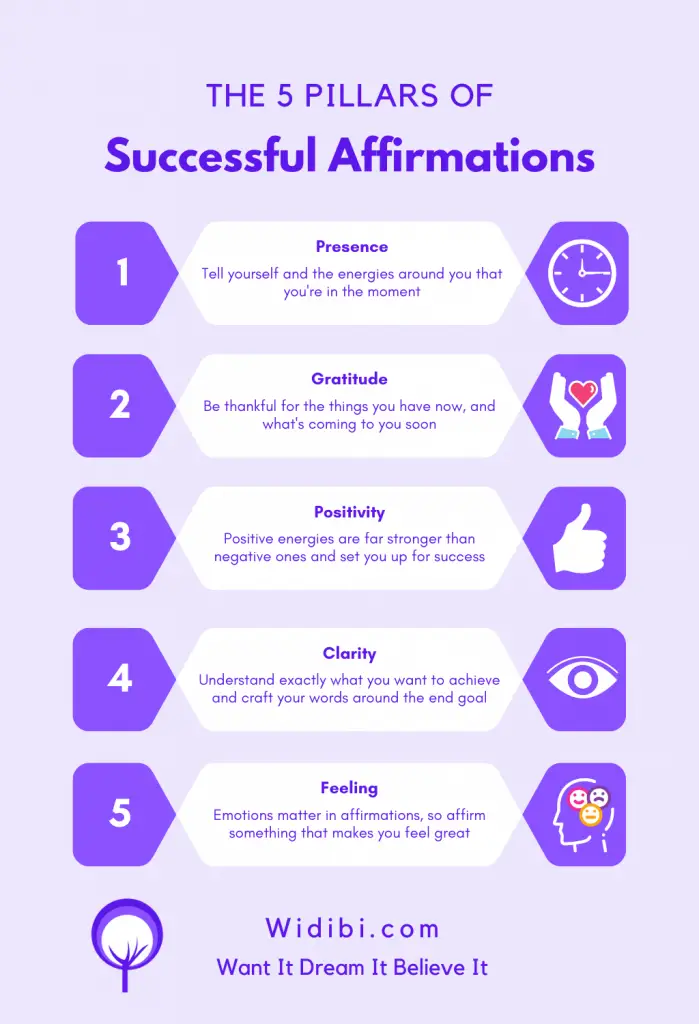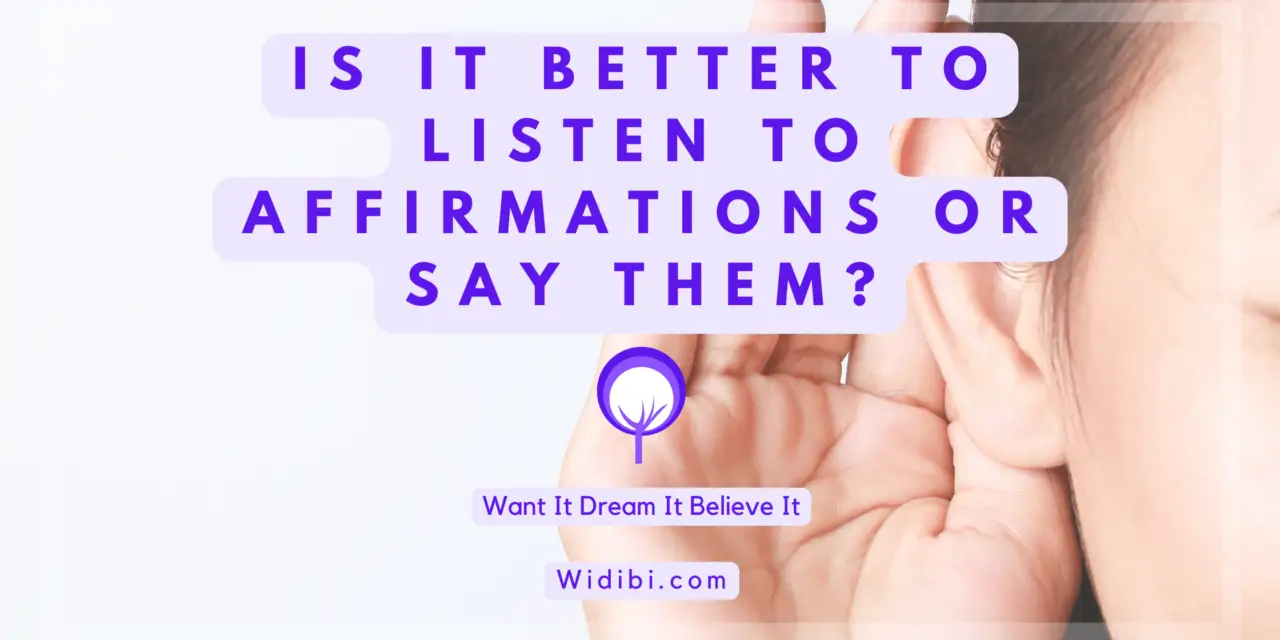You might be wondering if it’s better to listen to affirmations or say them, and the truth is that both approaches can be equally valid. You might even consider doing both – although not at the same time, of course!
I haven’t written all that much about listening to affirmations here at Widibi before. I’ve touched on a number of different approaches, including writing them down, saying them out loud, and putting them on a vision board, and they’re all very valid. However, I’d happily add listening to them to the list for one simple reason.
Affirmations aren’t about what you do. They’re about how you feel when you do them.
If you live in a busy home and don’t want everyone within earshot to hear you saying, “I am powerful and motivated,” then saying affirmations is out of the question.
Likewise, if your hand cramps up at the thought of writing entire passages in a manifestation journal, then writing affirmations might not be ideal for you.
Listening to affirmations can be the ideal solution. We’ve already established that you can manifest on your phone, often using the notes app or a word processor. However, your phone can also serve as the ideal tool to enable you to listen to affirmations – and you can record them too.
Should You Only Listen to Your Own Affirmations?
One of the main concerns with listening to affirmations is whether you can benefit from the affirmations of others. Once again, it depends.
Consider the five pillars of successful affirmations:

To listen to affirmations created by others, they must be relevant. It’s often easier to find content like this when your affirmations aren’t overly specific and usually when you’re not using them for manifestation.
For example, “I feel great today” is an affirmation. It can apply to anyone because it’s non-specific. For one person, feeling great might mean having lots of energy. For another, it could mean that they’re switched on and ready to tackle the challenges that lie ahead mentally. For yet another individual, it might mean feeling loved or appreciated.
These kinds of affirmations are ideal for listening to, as you don’t need to make them yourself. This YouTube video includes 21 morning affirmations and has over 11 million views in just under four years at the time of writing.
That statistic in itself demonstrates that listening to affirmations works. Even if it’s largely the same people coming back each day to repeat the same affirmations, would they do so if they weren’t getting anything out of it?
Given that this video, and indeed many videos of this type – like this one for daily affirmations and this one from the same creator as the first for health and wealth – use still images or simple animations, it’s clear that while they’re on YouTube, they’re designed for listening, not watching.
So, if nothing else, you have millions of pieces of social proof that listening to affirmations can work well.
Getting Specific When You Listen to Affirmations
The downside to those videos and other resources is you’re constantly going back and stating the same affirmations every day. While consistency is good, I wouldn’t want to affirm “I am motivated” when my biggest plans for the day involve lounging on the sofa in front of Netflix.
You have consistency, but you don’t have control.
That’s where you’d want to start creating your own, and it’s not hard. If you want videos – even with animations like those linked above, they’re not difficult to make. Record yourself through any microphone you have to hand and lay that recording over a few images and animations from Canva.
Even that might be overkill. Your smartphone undoubtedly either has a voice recorder built-in (Voice Memos comes built into the iPhone and is perfect for this) or has one readily available on its app store.
The most difficult part of making this happen is getting used to hearing your own voice! It’s a small price to pay for full control over your affirmations.
After all, if you’re trying to manifest a specific person or a particular model of car, there’s probably not a YouTube video out there saying it for you. You could hire a voice actor for the part, but, once again, that could well be considered overkill!
You only have to record an affirmation once, just as you only need to write it once unless you’re following a technique that involves writing it down multiple times. From there, you can fire it up when you need it. Think about the number of times you skip songs on Spotify each day or fire up a podcast. All that time can easily become time for affirmations, even if you’re focusing on something else.
Remember, affirmations aren’t about the words themselves or even who says them, but how they make you feel. If they can rebalance your energies and raise your vibrations, they get the job done.
So, Is Saying Affirmations Stronger Than Listening to Them?
Bringing things back around to the original question, you might still wonder whether you should listen to affirmations or say them.
It really does depend, and I’d encourage you to try both. What works for one may not work for another. Run an experiment. Say the same affirmation every day for a week and track how you feel. The next week, record the same affirmation and listen to it back whenever is convenient. Does it make you feel the same? Better? Not as good?
Everyone is wired differently and resonates differently with speaking and listening.
Neither practice is inherently more powerful than the other, and nobody can tell you without any doubt which will work best in helping you to achieve your goals.
Given that affirmations and manifestation are all about taking action, there’s no excuse not to take action to find out which works best for you! Don’t get hung up on the various options, either. Doing affirmations in any way possible is preferable to doing none at all.
Also, don’t let external factors hold you back. If you struggle to find the time, space, and peace to speak affirmations, with headphones being your only option, don’t worry about what could have been. Life gets in the way of perfection, so it makes plenty of sense to do whatever you can regardless of the challenges you face.










